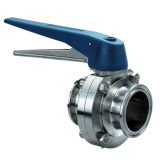Sanitary stainless steel fittings and valves are widely used in the Manufacturing Operation of Beer. The processes are:
Malt or Malt Extract
In many beer recipe kits, malt extract is included, usually in the form of a dry or syrupy liquid malt extract, serving as the base for the beer instead of traditional grain. To no surprise, both dry and liquid malt extracts are made from a process calling “malting.” The main difference between liquid and dry malt extracts is in the amount of water left in the end product – because this difference in water content, dry and liquid malt extracts cannot be interchanged.
Hops
Surely you know the hop craze over the last ten years or so. From IPAs to Double IPAs to, dare we say it, Triple IPA, hops are an essential ingredient in beer regardless of the concentration. Hops contribute to the bitterness of beer, and also help balance the sweetness. At the beginning of the boiling process, bittering hops are added, and flavoring hops are also included and added in the early stages of the boil.
Due to the style of beer that you’re going for, aroma hops may also be included. Aroma hops are usually added in later on in the boiling process and contribute an extra layer of aromas to the beer. There’s just nothing quite like pouring out a fresh IPA into a proper tulip glass and taking that first whiff.

Yeast
You can’t manufacture beer without yeast, it is important to the brewing process, yeast converts the sugars into alcohol, a fact that you’ll appreciate after a long week of work. Yeast comes in both liquid and dry form, and since yeast is a living organism, it is arguably the most important ingredient in terms of care and attention. When you’re tackling your homebrew, please be sure to not allow the yeast to get too warm or too cold – reliable room temperature is best.
Water
Water is the most obvious ingredient of beer. To get the best, crisp flavors out of your unique brew, it is better to use filtered water as opposed to regular tap water. After all, there’s a reason that beer giant Coors boasts about using pure “Rocky Mountain” water in their beer because the water they use and the beer they make contain about the same amount of flavor.
Specialty Grains and Powders
These might not be basic ingredients to brew beer, but in addition to the malt extract used in the brewing process, actually crushed grains or milled grains can be used. You can add depth and complexity to the color and flavor of the beer that you won’t get from an extract alone. Think about fancier beers – you’ll likely find actual grains used with varieties like chocolate malt, biscuit malt, malted rye, and so forth. Some kits even go as far as including other special ingredients like oak chips or oak powder, adding even more depth to your beer’s flavor profile.
Brew Beer Safely With Our Sanitary Stainless Steel Valves
The last thing you want is to have your carefully-constructed concoction compromised by bacteria or inferior stainless steel supplies.




Recent Comments